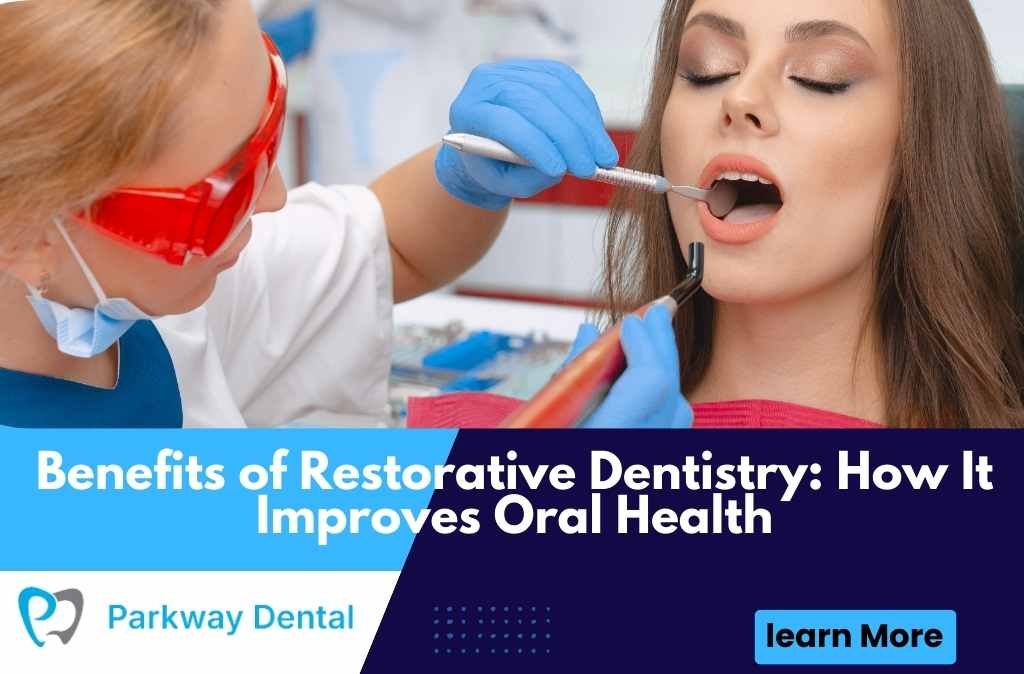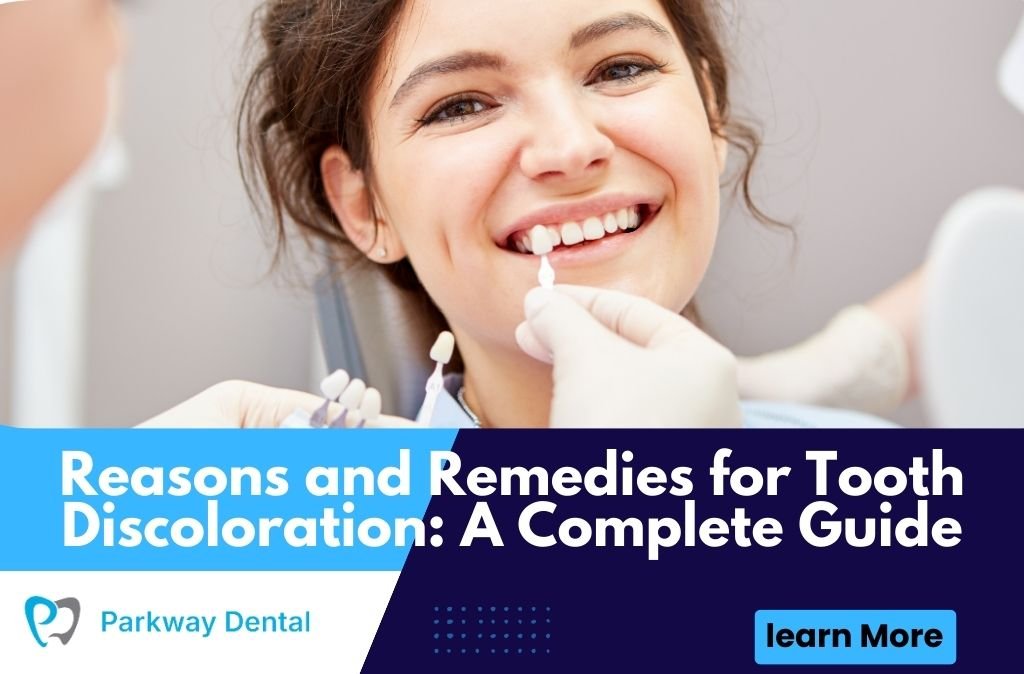Restorative dentistry is a vital field of dentistry that focuses on restoring the health, function, and appearance of teeth and gums. It is an essential part of maintaining oral health, preventing further complications, and improving the quality of life for individuals suffering from various dental issues. From fillings and crowns to implants and bridges, restorative dentistry provides a wide range of solutions for people with missing, damaged, or decayed teeth. We will explore the many benefits of restorative dentistry, how it improves oral health, and the various treatments involved. Additionally, we will look at how restorative dental procedures can positively impact your smile and overall well-being.
What is Restorative Dentistry?
Restorative dentistry encompasses a wide range of procedures and treatments aimed at restoring the structure and function of teeth. The goal is not only to repair damaged teeth but to restore their form and function to improve oral health and aesthetic appeal. It also plays an essential role in preventing further dental issues by addressing problems early on, such as tooth decay, gum disease, and tooth loss.
Some of the common restorative procedures include:
- Fillings: To repair cavities caused by tooth decay.
- Crowns: To cover and protect damaged or weakened teeth.
- Bridges: To replace missing teeth with artificial ones.
- Dental Implants: To replace one or more missing teeth with artificial roots and crowns.
- Dentures: To replace multiple missing teeth or an entire set of teeth.
These procedures help patients restore their smile, improve their bite, and prevent further dental problems, making restorative dentistry an essential part of comprehensive dental care.
Benefits of Restorative Dentistry
Restorative dentistry provides a variety of benefits, which include enhanced aesthetics, improved functionality, better oral health, and increased self-confidence. Below, we delve into some of the key benefits in more detail.
Improved Functionality and Comfort
One of the primary benefits of restorative dentistry is improved functionality. Damaged or decayed teeth can make it difficult to chew, speak clearly, and perform other essential tasks. Restorative dental treatments, such as crowns, bridges, and implants, help restore the functionality of teeth, allowing you to eat and speak with ease.
For instance, dental implants are designed to mimic the function of natural teeth. They provide a strong, durable solution for missing teeth, improving your ability to chew and speak without discomfort. This can greatly improve your overall quality of life.
Enhanced Aesthetics
Restorative dentistry can dramatically improve the appearance of your smile. Whether you have missing teeth, discolored fillings, or damaged enamel, restorative dental treatments can restore the natural beauty of your teeth. Procedures like porcelain crowns, dental veneers, and bonding are designed to enhance the appearance of your teeth, giving you a beautiful and confident smile.
Moreover, restorative dental treatments are customized to match the color, size, and shape of your natural teeth, providing a seamless and natural-looking result. Whether you are looking for minor aesthetic enhancements or a full smile makeover, restorative dentistry offers the solutions you need.
Prevention of Further Dental Problems
By addressing dental issues early on, restorative dentistry helps prevent the development of more serious oral health problems. For example, fillings can prevent cavities from spreading, and crowns can help protect weakened teeth from further damage. Dental implants and bridges can also prevent the shifting of adjacent teeth, which can lead to misalignment and other issues.
Restorative treatments can also prevent the need for more invasive procedures in the future, such as tooth extractions or root canal treatments. By opting for restorative care, you can maintain the integrity of your natural teeth and avoid additional dental complications.
Restoration of Lost Teeth
Missing teeth can have a significant impact on both the function and appearance of your smile. Restorative dentistry provides solutions to replace missing teeth, restoring your smile and enhancing your ability to chew and speak properly. Dental implants are one of the most popular options for replacing missing teeth because they provide a durable, long-lasting solution.
Bridges and dentures are also effective alternatives for patients who have lost multiple teeth. These treatments can help fill in the gaps in your smile, improving your oral function and overall appearance.
Protection of Natural Teeth
Restorative dentistry helps protect natural teeth that may be weakened or at risk of further damage. For example, crowns can be placed over teeth that are cracked or severely decayed to protect them from breaking further. Similarly, root canals can be performed to save a tooth that is infected, preventing the need for extraction.
By preserving your natural teeth, restorative dentistry ensures that you maintain a healthy, functional mouth for years to come.
Enhanced Self-Confidence
A beautiful smile can have a significant impact on your self-esteem and confidence. People with missing, decayed, or damaged teeth may feel embarrassed about their appearance, leading them to avoid social situations or hide their smile. Restorative dental treatments can help restore the appearance of your teeth, giving you a smile you can be proud of.
Improved self-confidence can positively affect various aspects of your life, from personal relationships to professional interactions. When you feel good about your smile, you are more likely to engage with others and take on new challenges with confidence.
Long-Term Durability and Cost-Effectiveness
Restorative dental treatments, especially dental implants, crowns, and bridges, are designed to be long-lasting. These treatments provide a durable solution to common dental problems, ensuring that you get the most value for your investment. While the initial cost may be higher than temporary options like fillings or dentures, the long-term benefits and durability of restorative treatments often make them a more cost-effective solution in the long run.
Improved Oral Health
Restorative dentistry does more than just improve the appearance of your teeth; it also promotes better oral health. When teeth are damaged or missing, it can create spaces where bacteria can accumulate, leading to an increased risk of tooth decay and gum disease. By restoring damaged teeth or replacing missing ones, restorative dentistry helps maintain a cleaner and healthier mouth.
For example, dental implants prevent bone loss that can occur when a tooth is missing, while fillings and crowns help protect against the spread of decay. Overall, restorative treatments help support good oral hygiene and reduce the risk of future dental problems.
Types of Restorative Dental Procedures
There are many different restorative procedures designed to address specific dental issues. Below are some of the most common restorative treatments used by dentists to improve oral health.
Fillings
Fillings are one of the most common restorative treatments for tooth decay. When a cavity forms in a tooth, the decayed portion is removed and replaced with a filling material. There are several types of filling materials, including composite resin, porcelain, amalgam, and gold.
Composite fillings are popular for their ability to match the natural color of your teeth, making them an ideal option for visible areas. On the other hand, amalgam fillings are more durable and resistant to wear, making them suitable for back teeth where chewing pressure is greater.
Crowns
Crowns are caps that cover a damaged or weakened tooth, restoring its shape, size, and strength. Crowns can be made from various materials, including porcelain, metal, or a combination of both. They are typically used when a tooth is too damaged for a filling but not severely enough to require extraction.
Crowns are often used after a root canal treatment or to protect a tooth that has been weakened by extensive decay or damage. They help improve the function of the tooth and prevent it from breaking further.
Bridges
Dental bridges are used to replace one or more missing teeth. A bridge consists of a false tooth (or teeth) anchored in place by dental crowns on the adjacent teeth. Bridges are a good option for patients who have lost teeth but have healthy teeth on either side of the gap.
Bridges help restore the appearance of your smile and improve your ability to chew and speak properly. They can also prevent neighboring teeth from shifting into the gap left by missing teeth.
Dental Implants
Dental implants are one of the most advanced and long-lasting restorative treatments available. They involve the surgical placement of a titanium post into the jawbone, which serves as a replacement for the root of a missing tooth. After the implant has integrated with the bone, a crown is placed on top to restore the tooth’s appearance and function.
Dental implants are a popular choice for patients who have lost one or more teeth due to injury, decay, or other factors. They are durable, stable, and designed to look and function like natural teeth.
Dentures
Dentures are removable dental appliances used to replace multiple missing teeth or an entire set of teeth. They can be either partial or full, depending on the number of teeth that need to be replaced. Dentures are made from acrylic, porcelain, or a combination of materials and are designed to fit comfortably in the mouth.
Dentures improve the appearance of your smile, restore oral function, and help maintain facial structure by supporting the cheeks and lips.
Learn More: Restorative Dentistry in West Roxbury, MA
Conclusion
Restorative dentistry offers a wide range of benefits that can improve your oral health, restore the appearance of your smile, and enhance your overall quality of life. From fillings and crowns to implants and dentures, restorative treatments help address a variety of dental issues, including tooth decay, missing teeth, and damaged enamel. By investing in restorative dentistry, you are not only enhancing your smile but also taking an important step toward better oral health.
If you’re in need of restorative dental care, consider visiting Parkway Dental, your trusted Dentist in West Roxbury, MA. Our experienced team of dental professionals is committed to providing high-quality, personalized care to help restore and maintain your oral health. Whether you need a filling, crown, dental implant, or complete smile makeover, Parkway Dental is here to help you achieve a healthy, beautiful smile.





